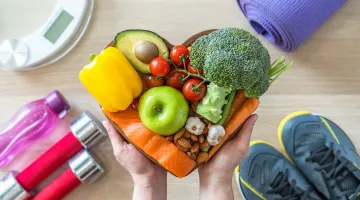The Right Diet for a Healthy Heart
Author

South Shore Health
When it comes to keeping your heart healthy, many people are familiar with the basics: stay active, avoid smoking, watch your weight, and manage your stress. However, there’s a key component to heart health that many people would rather avoid discussing altogether: their diet!
The foods you eat on a regular basis have a tremendous impact on your overall heart health.
Taking a hard look at your diet can be tough — after all, we all have those foods we love, but we know we probably shouldn’t be eating regularly.
However, adopting a heart-healthy diet doesn’t mean you need to quit all of your favorite foods.
Below, are answers to some common questions on how individuals can incorporate heart health into their diets.
What are some foods that people should generally avoid for better heart health?
All of your favorite foods can be included in a heart-healthy diet. But there are some foods to limit, such as processed foods, high-sugar foods, and foods high in saturated fat.
To give you an idea of what kind of foods these may be, think of all the packaged things you see in the grocery aisle: the cookies, the cakes, etc. Also, taking steps to limit red meat, processed meat, and fried foods is a good idea.
Thinking of those foods as occasional treats, not regular parts of your diet, is ideal.
What should people know when starting a more heart-healthy diet?
The first thing to know is that you don’t have to follow a perfect diet. In fact, there’s no such thing as an absolute perfect diet!
Start by taking small steps toward a healthier diet. Key components of a heart-healthy diet are vegetables, fruits, whole grains, heart-healthy fats, and lean proteins from fish or plant sources such as beans.
Keeping a food log is a great way to see both what you might be missing as well as what you might be getting too much of in your eating pattern.
What role does alcohol consumption play when it comes to heart disease?
The American Heart Association recommends no more than two drinks per day for men and one drink per day for women. It also doesn’t recommend stockpiling it all for one night on the weekend.
There have been studies that show excessive alcohol use has been linked to stroke, heart disease, and all the other stuff we don’t want. However, there have also been studies that show that moderation with alcohol can actually keep you healthy.
Some studies have shown that the antioxidants in red wine can actually help lower that LDL cholesterol, which is the one that we want low, but other studies suggest it’s no better than beer or liquor in preventing heart disease.
I wouldn’t recommend that you start drinking for heart health, but if you do drink, and you’re keeping it within moderation, it shouldn’t be harmful to your heart health.
From a nutritional standpoint, what is the best way to prevent heart disease?
One of the best eating patterns to follow to prevent heart disease is a Mediterranean eating pattern. The Mediterranean eating pattern kind of includes everything.
It focuses on a lot of vegetables, fruit, whole grains, beans, and heart-healthy fats. It also includes low to moderate amounts of protein from animal products, such as dairy and meat. However, its main protein focus is more on pulses—the technical name for edible seeds of plants in the legume family, such as beans, chickpeas, and lentils—as well as fish or other lean meat, like chicken.
For a typical Mediterranean dish, at least half of your plate would be vegetables. It might also include protein from beans or healthy, fatty fish (like salmon), along with some sort of whole grain, like quinoa or brown rice.
Do I have to completely cut out meat to be heart healthy?
No, you do not have to cut out meat completely, but depending on how much you eat, cutting down can help.
When eating meat, it’s best to choose the leaner cut if you can. Typically, if you include meat in your diet on a regular basis, we recommend the leaner sources, such as skinless poultry and fish and lean cuts of pork.
When red meat has the white marbling throughout, you can tell it’s high in saturated fat. Limit those types of meats to special occasions, and focus more on the lean options. If you are trying to reduce your meat intake, experimenting with beans or tofu is a great way to start.
It’s not that you can never have the other, fattier steak.
If you really love that high-fat steak, just have it every once in a while — that’s okay! It’s what you do most of the time that matters.
If you have a diet very high in those animal fats, work on cutting back a little bit and adding in more plant-based foods.
Are there certain things to keep in mind if I’m on a heart medication and want to change my diet?
Yes, with certain medications.
For example, if someone is on warfarin (sometimes called by its brand names Coumadin and Jantoven), that patient has to be careful of Vitamin K intake, which is in a lot of those dark, leafy vegetables. Vitamin K can make warfarin less effective and can increase the risk of blood clots.
If someone is on Lasix®, he or she will need more potassium, because the drug can cause lower potassium levels.
All different medications can have their different effects, so that’s why it’s important to meet one-on-one with a dietitian if you’re thinking about making big changes. We take into account your medical history and all your medications before making recommendations.
(Click here to learn more about dietitians and the role they play on your healthcare team.)
What about sodium and heart disease?
Watching your sodium is key, especially if you are salt sensitive, because excess sodium causes you to retain fluid, which is going to make your heart work harder, and we don’t want that.
Cutting back on sodium is a very good idea if you are just trying to live a healthy lifestyle, but is an especially good idea if you have heart disease or any sort of high blood pressure.
Usually, we recommend no more than 2,000mg of sodium per day, and you’d be surprised how many foods have sodium — it’s not just the salt shaker!
A lot of processed foods, frozen foods, and canned foods are going to be really high in salt. Reading those nutrition labels is definitely helpful in cutting back on your sodium intake.
To learn more about South Shore Health's nutrition services, click here.
Author

South Shore Health






